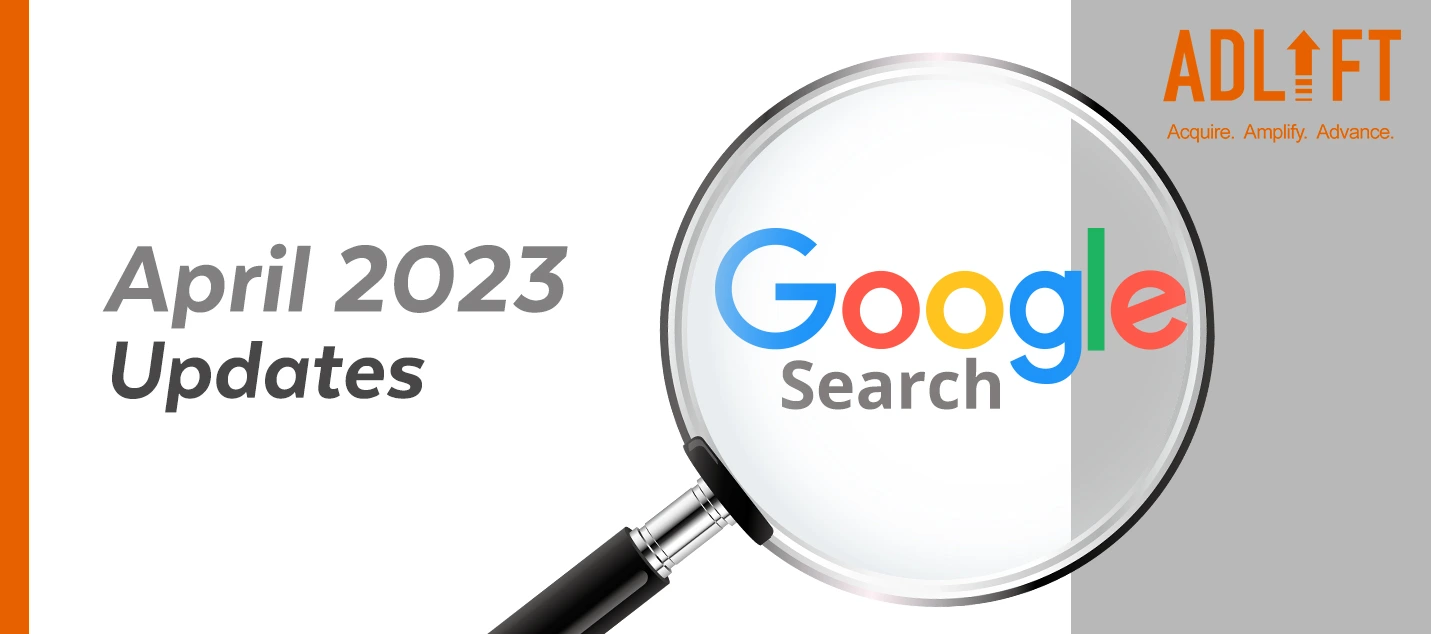Google Search April’23 Updates

Google has introduced new updates for Google Search. In this article, we will go over all the latest updates that the search engine has made, including the bulk data export, search guidelines, status dashboard, search developers’ documentation, as well as some other exciting updates!
Bulk data export feature
Let’s get started with the first update: The bulk data export update came out in February 2023. This new feature has been added to the Search Console, which enables the ongoing export of data to Google BigQuery.
Through bulk data export, users can set up an export in Search Console to receive a daily data dump into their BigQuery project. The exported data contains all performance data except for anonymized queries, which are excluded for privacy reasons. This means that the daily data row limit does not affect the bulk data export, allowing users to explore their data to its fullest potential by combining it with other data sources and utilizing advanced analysis and visualization techniques.
For websites with a large number of pages or those that receive traffic from many queries per day (or both), this data export feature can be particularly useful.
Fresh Search Guidelines
Now, we move on to some fresh search guidelines. This year has seen some major advancements in AI-generated content (Yes, we’re talking about ChatGPT). To help avoid the problem of unhelpful, mass-produced AI content, Google came out with fresh search guidelines.
To promote helpful content generation, Google started rewarding high-quality content, however it is produced. The goal of Google’s ranking algorithms is to recognize and promote exceptional content that showcases characteristics such as expertise, experience, authority, and trustworthiness, which are collectively referred to as E-E-A-T.
Learn about the Google E-E-A-T update, here – Google April Review Update.
With the fresh search guidelines, Google focuses on content quality instead of content creation methods which have been a valuable principle that has enabled them to provide dependable and superior outcomes to their users. Additionally, Google recommends evaluating your content in terms of “Who, How, and Why” as a way to stay on course with what their search guidelines seek to reward.
Generating content using automation, including AI, with the intention of manipulating search engine rankings is considered spam and violates our policies. However, it’s important to note that not all uses of automation and AI generation are considered spam. For instance, automation has been used in the past to generate useful content like sports scores, weather forecasts, and transcripts. AI has the potential to drive higher levels of creativity and expression, and it can serve as an important tool to help individuals create quality content for the internet. As long as AI is used appropriately for content creation, it is not in violation of Google’s guidelines.
Status dashboard
If you’re interested in staying up-to-date with the status of Google’s search systems, you’ll be happy to know that a new tool has been introduced. This tool is designed to provide information on crawling, indexing, and serving, which are all crucial components of the search process.
While it’s important to note that system disruptions are rare, Google wants to ensure transparency when they occur. Previously, the company relied on their Site Reliability Engineers (SRE) to post updates on disruptions via its Google Search Central Twitter account. However, with the introduction of the Google Search Status Dashboard, it’s now even easier to stay informed about the current status of Search.
Search Developer Documentations
Now over to some updates in search developers’ documentation. First up is the Google search quality rater update. A lot of content producers are acquainted with the notion of E-A-T, which Google uses to determine if their search ranking algorithms are furnishing useful and pertinent information. To enhance their assessment of outcomes, E-A-T is now augmented with a new factor: ‘Experience.’ Google has just launched updated search evaluator guidelines that incorporate this new concept, E-E-A-T or “Double-E-A-T” for short.
Canonical Links
Apart from this, Google recently updated some documentation for canonical link annotations. These give search engines some hints regarding your preferred pages for indexing.
Google Visual Elements Gallery
The Visual Elements Gallery is a newly developed resource by Google aimed at assisting individuals in recognizing the prevalent and significant visual components of a search results page. It encompasses a collection of 22 visual elements that are commonly featured on search result pages and hold relevance to both website owners and professionals involved in SEO.
Link Best Practices
Last but definitely not least is their set of recommendations for linking. Through this, Google lists out some of the best practices to keep in mind when it comes to linking. If you want to read more about these best practices, you can read this document from Google.
It’s only been 4 months since the beginning of 2023 and Google has kept us on our toes, with one update after the other, keeping up has been a challenge. AdLift has your back though, our blogs will make sure that you are always ahead of the competition armed with the latest information!
Recent Posts
- Go Viral in Seconds: How to Upload a YouTube Short? April 17, 2024
- Multi-Channel Mania: Mastering Distribution Channels to Reach Customers Everywhere April 12, 2024
- From Product to Promotion: A Fresh Take on the 4 Ps of Marketing April 12, 2024
- Is Your Marketing Paying Off? The Ultimate Guide to ROAS April 12, 2024
- Understanding HTML Sitemaps: A Key Component for Website Structure April 12, 2024
- Checking Website Traffic: Tools and Methods for Analysis April 12, 2024
- Exploring Sitemap Examples: A Guide to Effective Website Organization April 12, 2024
- Tackling Cart Abandonment: Strategies for Recovering Lost Sales April 11, 2024
- “Crafting Your Unique Selling Proposition: Stand Out in the Market “ April 11, 2024
- Create Content that Connects: Target the Most Searched Topics on YouTube April 1, 2024
Get
in Touch
Contact AdLift for a 360-degree marketing plan

